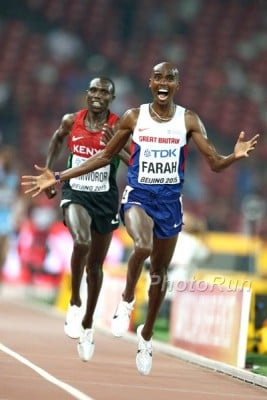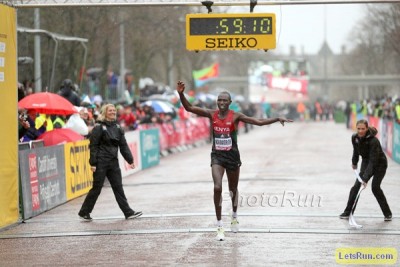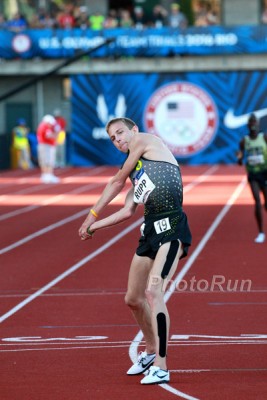2016 Olympic Men’s 10,000 Preview: Mo Farah vs. Geoffrey Kamworor In a Rematch of Epic Proportions
by LetsRun.com
August 9, 2016
Paavo Nurmi.
Emil Zátopek.
Lasse Viren.
Haile Gebrselassie.
Kenenisa Bekele.
If you were to commission a Mt. Rushmore of the greatest long-distance runners in history, you’re probably picking between those five. They also happen to comprise the complete list of men to have won two Olympic 10,000-meter titles. That’s the company Mo Farah will be looking to join on Saturday night in Rio. Apart from running immortality, there’s not much at stake.
|
Race Time: 8:25 p.m. ET Saturday 2015 Worlds Results 2016’s Fastest performers (among men entered) |
The Mo Show
Farah has dominated the last few years like few others before him, winning every global outdoor title on offer since September 1, 2011 (that’s four 5,000 crowns and three 10,000 crowns for those counting at home). And after another season in which he’s displayed incredible versatility — so far this year he’s run 3:31 for 1500, 12:59 for 5,000, 26:53 for 10,000 and 59:59 for the half marathon — he’ll be favored to claim two more victories in Brazil, a total that would move him past Kenenisa Bekele for most combined global 5,000/10,000 titles (although it should be pointed out it was much harder to double during Haile Gebrselassie’s era as there were two heats of the 10,000 at Worlds from 1991-1997 and at the Olympics in 1996 and 2000).
The questions facing the rest of the field hasn’t changed for four years: How do you outkick a guy that nobody can outkick? And how do you drop a guy that nobody can drop?*
If you have an answer, please send it to:
Athletics Kenya
Riadha House
Nairobi, Kenya
After the 2012 Olympics and 2013 Worlds, the cry went out: “You’ve got to team up to beat him! Force the pace from the gun and try to run the kick out of him!” Well the Kenyans tried that last year in Beijing, and the result was the same: Farah streaking to gold in the home stretch, albeit with a slightly faster time (27:01). A week after that race, Farah’s competitors in the 5,000 employed the opposite strategy — they slowed it way down, which produced the slowest winning time in championship history (13:50). It didn’t matter: Farah won by an even bigger margin than he did in the 10,000 thanks to his 1:48 final 800.
There are other strategies the field could try — perhaps repeatedly surging early in the race? — but most runners are loath to sacrifice their individual race plans and try something out of the ordinary with no guarantee of a different outcome. Really, the best hope anyone has is getting into better shape than Farah. There’s one man who could do it: Geoffrey Kamworor.
Kamworor, like Farah, is a total stud. A throwback who excels on any surface, in 2015 Kamworor won the World Cross Country title in March, took silver to Farah in the 10,000 at Worlds in August and finished second to Stanley Biwott in the New York City Marathon in November. Kamworor accomplished all that at the age of 22.
So far, he’s raced three times on the track/roads in 2016. His first outing came at the World Half Marathon Championships in March, where Kamworor unleashed one of the greatest performances in the history of the event (LRC A Legend in the Making: Geoffrey Kamworor Dethrones Mo Farah Despite Falling and Getting Trampled at World Half Marathon Championships).
Despite falling at the start (he was on the ground for seven seconds), Kamworor managed to pick himself up, weaved through the legion of bodies (there was a mass race that started right behind the championship race) and run 59:10 in wet, windy conditions to win the race. An even better sign? He was able to break Farah in that race, and the Brit had to settle for bronze, 49 seconds behind Kamworor (If you are an astute reader, you noticed that earlier in the preview we put an * after calling Farah a guy that “nobody can drop” because a more accurate description would be to say Farah is someone “nobody can drop on the track”).
Kamworor then traveled to Eugene, where he broke 13 minutes for the first time in the 5,000, finishing just behind Ethiopia’s Muktar Edris, who has won two Diamond League 5k’s this year. Kamworor’s most recent race, however, did not go well: at the Kenyan Olympic Trials on July 1, he had to drop out after 8 kilometers and was taken to the hospital for an IV. Obviously that’s not the best way to head into the Olympics, but Kamworor fans can take solace in two facts:
1) Conditions were brutal
If you thought the U.S. Olympic Trials 10,000 was rough, it was nothing compared to the Kenyan Trials. The race was held at 7,000+ feet of elevation in Eldoret in 70-degree temperatures with a bright sun shining. Kamworor wasn’t the only man to drop out as last year’s World Champs fourth placer Bedan Karoki only made it two miles.
2) Kamworor has already bounced back from one DNF this year
In January, Kamworor won the Kenyan Police XC Champs but dropped out of the Discovery XC Champs two weeks later. It turned out there wasn’t anything wrong with him as he came back two weeks later to win the Kenyan XC Champs before earning World Half Marathon gold a month later.
Kamworor has a few other things working in his favor as he prepares to take on Farah in Rio. First is the fact that he beat Farah at the World Half Champs in Cardiff. Obviously, a half marathon is a lot longer than a 10,000, but that race proved that Farah can be broken and that Kamworor can be the man to do it. It doesn’t mean that he’ll be able to do it in a 10k (a distance that favors Farah), but Kamworor will at least have some confidence now. If he had lost to Farah at 13.1, it would be hard to hold out hope that he could beat him in a 10k.
Kamworor should also have the support of his teammates again — after they went 2-3-4 at Worlds last year, Karoki said that he considered the Kenyan team tactics a success and suggested the Kenyans would try to work again in Rio (they’re sending the same squad — Kamworor, Karoki and Paul Tanui). If you’re willing to overlook that DNF in Eldoret and focus purely on fitness, Kamworor looks to be in peak shape. His half marathon performance was ridiculous and though Farah is the superior 5,000 runner, Kamworor’s 12:59 — in warm, sunny conditions at Pre — is a good time for a 10k/HM specialist. Kamworor wasn’t that far behind Farah last year, and if he’s in better shape than he was 12 months ago, he has a chance.
Yet all that may not be enough to beat Farah. Farah has looked untouchable on the track this year, accelerating easily at the end of a 26:53 race to win the 10k at Pre and soloing a world-leading 12:59 in London on July 23 in his last pre-Olympic outing. That 12:59 impressed us immensely as Farah mainly was pushing himself against the clock. Knowing that the pace in Rio will likely be brutal in the 10,000, Farah likely wanted to get a trial run in on what it feels like to be in the hurt box. In between, he went 3:31 in Monaco, showing he’s still got the speed that makes his kick the best in the game. Really, it doesn’t make sense to bet against Farah for gold. Kamworor may well become the Olympic champion one day, but he’ll likely have to wait until 2020 to do it.
Other Medal Contenders
- Paul Tanui, Kenya, 25 years old: Tanui has taken bronze at each of the past two World Championships and has a great shot to add a third medal at his debut Olympics. He was the sole survivor of the “Big Three” at the Kenyan Olympic Trials, running 27:46 to win the race in tough conditions. One worry: though Tanui ran 12:58 last year, Kamworor smoked him in the 5,000 at the Pre Classic in May, where Tanui was 12th in 13:15.
- Yigrem Demelash, Ethiopia, 22 years old: The 2012 world junior champ, Demelash ran 13:03 and 26:57 as an 18-year-old four years ago and after a few low-key years, has reemerged as a force to be reckoned with, finishing fourth in the 5,000 in the Stockholm DL meet on June 16 before winning the Ethiopian 10,000 Trials by six seconds on June 29 in a world leading 26:51.11. If you’re the world leader and the Ethiopian Trials champ, you’re always going to be a serious medal contender. He has a similar background to countryman Ibrahim Jeilan (who was the world junior 10k champ in ’06 and world junior cross champ in ’08), who came from relative obscurity to shock Farah at Worlds in 2011.
- Bedan Karoki, Kenya, 25 years old: Karoki, like Kamworor, was a casualty of the brutal Kenyan Trials but he owns a similar resume: fourth at Worlds last year and second (ahead of Farah) at the World Half Champs in March. Does he have the speed to medal in a championship race though?
- Abadi Hadis, Ethiopia, 18 (?) years old: There’s a bit of uncertainty about who, exactly, Hadis is. Earlier this year, he was entering races under the name “Abadi Embaye” with a birth year of 1999. Now the IAAF bio of Abadi Embaye is dead but there’s a new one up with the name Abadi Hadis which has the same set of results but a birthdate of November 6, 1997. If this were some age-group championship, we’d be more concerned, but this is the Olympic Games. Hadis can run — he clocked 13:02 in Shanghai and ran 26:57 for third at the Ethiopian Trials — and that’s all that matters. As someone who only emerged on the scene recently (he has no results listed on All-Athletics.com before 2015), he’s got the potential to surprise in Rio.
- Tamirat Tola, Ethiopia, 25 years old: Tola has proved his worth over a variety of surfaces and distances. He’s a 2:06 marathoner who finished sixth at World Cross last year and fifth at the World Half Champs in March. He has run 26:57 twice this year, first at the Pre Classic in May and then again at the Ethiopian Trials a month later. Though that’s obviously a good time, he was only third at Pre, four seconds back of Farah and three behind Kenyan William Malel Sitonik, who didn’t even make the Kenyan team. Tola could have trouble medalling, especially in a slow race.
Galen Rupp’s Chances
As the reigning Olympic silver medallist, we certainly consider Galen Rupp a medal contender, but we didn’t list him above as he deserves his own section. Rupp is an intriguing figure for many reasons, chief among them the 10,000/marathon double he’ll be attempting in Rio. Though the double is not unprecedented, it is uncommon. Dan Browne was the last American to try it, in 2004 (he was 12th in the 10,000, 65th in the marathon) but Browne was not a medal threat like Rupp. Before that, you’d have to go back to Frank Shorter in 1972 (5th 10,000, 1st marathon). Only two men in history have ever medalled in both events at the same games: Mamo Wolde in 1968 (silver 10k, gold marathon) and Emil Zátopek in 1952 (gold 10k, gold marathon; he also won the 5k for good measure). It is a formidable task.
Mentally, Rupp is up to the challenge. His coach, Alberto Salazar, believes Rupp can run well in both events, and Rupp has unshakeable belief in Salazar. Whether his body can hold up to run both events at a high level remains to be seen. The biggest challenge, clearly, is keeping Rupp’s closing speed intact while logging mega miles and long, hard tempos. It’s a delicate balance, and so far in 2016, Rupp’s kick in shorter races has suffered as a result. He did run 13:20 at the Portland Track Festival, closing in 56, but he was beaten by collegians Justyn Knight and Woody Kincaid at the Stumptown Twilight meet on June 23 and had nothing in the Olympic Trials 5,000 final, going from first to ninth in the final 400 meters.
These results can’t be viewed in a vacuum. The Stumptown meet, especially, isn’t worth much as Rupp was coming off a couple of tough workouts, including a killer 22-mile tempo. And though he struggled in the 5,000 at the Trials, Rupp still crushed everyone in the 10,000 — the distance he’ll be racing at the Olympics. If this were a normal year, we’d trust Rupp’s speed to come around — remember how he ran 4:00 for the mile in his last race before Worlds last year? But this is not a normal year. Rupp has still been doing speed work, but it’s incredibly hard — perhaps impossible — to develop his speed to the point where he can medal in the 10,000 while training to run a good marathon. Marathon training obviously offers aerobic benefits, and there’s some overlap with the 10,000. But the best way to medal in the 10,000 is to do 10,000 training. Not 10,000/marathon training.
Let’s give Rupp and Salazar the benefit of the doubt, though. Let’s say that marathon training hasn’t affected his speed at all. Even then, it’s going to be tough for Rupp to medal in Rio. First, it needs to be pointed out how much of an outlier Rupp’s medal in London was: it was the only Olympic/World Championship 10k medal for a man born outside of Africa since 1988. Rupp has remained in contention since then, but he’s been moving backwards: he was fourth at Worlds in 2013 (1.78 secs off a medal) and fifth in 2015 (4.14 secs off a medal). Still, Rupp was one of just five men in contention at the bell last year (sixth place was 35 seconds back). It’s not like he was that far away from medalling.
If you look back to Rupp in 2012, there were signs that a medal was possible. First, he ran massive PRs at both 1500 (3:39 to 3:34) and 5,000 (13:06 to 12:58). Second, and more importantly, his kick had never been better: remember, at the Olympic Trials, he closed in 52.54 to win the 5,000 over Bernard Lagat, at the time the reigning silver medallist at Worlds. One of the biggest reasons Rupp was able to take silver in London is because the race was slow (27:30) by championship standards (slowest Olympics since ’92; slowest Worlds/Olympics since ’01), which allowed Rupp to capitalize thanks to his awesome kick.
So you’d think that the best way for Rupp to win a medal in Rio would be to hope for a slow race. But Rupp’s kick has eroded over the past few years, and that was before he added marathon training on top of it. So does that mean Rupp is better suited to a faster race? Well, last year’s World Championship final in Beijing was fast, and the result was that Rupp had nothing left over the final 300.
That being said, Rupp may be stronger this year than last year due to his marathon training. Rupp certainly showed at the Trials that he can still rock a 10k. But when you compare Rupp’s results in 2012 to his results in 2016, it’s clear that the Rupp of four years ago was much better positioned to medal. In 2016, Rupp has not shown the ability to kick well enough to medal in a slow race, but we certainly don’t think this race will be slow. Rupp should be in the hunt, and if he catches a few breaks, he could maybe find himself on the podium, but his odds of winning, with Farah in the field, are slim to none. The online betting sites are giving you 25-1 for Rupp to win and 3-1 for him to medal.
The other Americans are both enjoying career years, but a medal is out of the question for both of them. Shadrack Kipchirchir ran a tremendous race at the Trials and was the only man Rupp didn’t manage to drop (until very late). He also ran 13:18 to win Payton Jordan in May, but a 13:18 5k pb isn’t scaring anyone in this field. Kipchirchir was only 16th last year, and should beat that, perhaps challenging for top 10. Kipchirchir’s Army teammate Leonard Korir is the third member of Team USA. Korir’s best 10k is 27:29, but that was back in 2011 and he hasn’t come close to it since (he ran 27:58 in April). Top 15 would be a good goal.
LRC Prediction: 1. Farah 2. Kamworor 3. Tanui
Farah has dominated ever since his double gold in London four years ago and has looked great in 2016. Age has to start catching up with him soon, as he’s now 33, but we hasn’t seen any signs of it. As good as Kamworor is, we can’t pick him over Farah in a race less than 10 miles, but he’s better than everyone else. Tanui won the Kenyan Trials and has come through for bronze at each of the last two world champs. We like that consistency to continue, ensuring the same podium we had in Beijing last year.
That being said, if you are thinking of placing a bet on this race, we think that betting on Kamworor to win is something you might want to consider. It seems like they online bookies think Farah is more of a sure thing than we do as you can get Kamworor at 4 or 5 to 1, which is the play we’d make.
As for Rupp, while we ultimately think marathon training makes lots of distance runners better, in the year 2016 we think it’s impossible to properly train for both events at the same time. There’s a reason why no one had medalled in both the 10,000 and marathon since 1968. It’s basically impossible to do. To medal in this race, Rupp likely needs to be in American record shape which seems impossible to achieve if he’s properly training for the marathon.
Vote in our poll below and then talk about this race in our world famous fan forum / messageboard: MB: 2016 Men’s 10,000 Preview: Will Mo Farah win again? Does Galen Rupp have a shot at a medal?
| [gravityform action=”polls” id=”432″ mode=”poll” cookie=”1 month” show_results_link=”false” display_results=”true” percentages=”true” counts=”false” ajax=”true”] |






